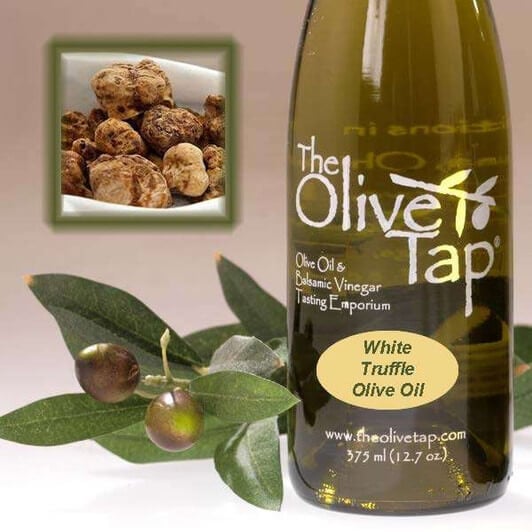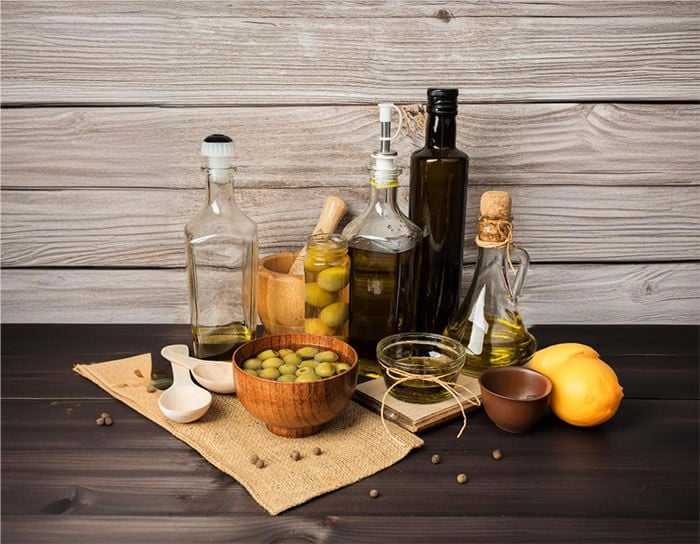Our Blog

Olive Tap Announces 100% USDA Certified Organic Truffle Oil!
Made with Real White Truffles.
By Rick Petrocelly
© The Olive Tap 2013
Would you prefer this...
Chemical Infusion
or this...
Truffles
in your dinner?
The unmistakable flavor of White Truffle (Tuber magnatum) is something very special and unique in the culinary world. True Italian White Truffles are indeed rare, and as a result they have been ranked #3 among the “Top Ten Exclusive and Rare Foods” from around the world. Positioned ahead of Caviar, Kobe Beef, Matsutake Mushrooms, Yubari Melon and Saffron, they are among the most elite of natural products. Unfortunately, buying White Truffles is no easy chore outside of Italy. And at a price of over $4,300.00 per pound, purchasing even a small grape sized ½ oz White Truffle for about $135.00 can be an expensive proposition for a single meal.
While the aroma and flavor of White Truffle is unique, it has been described by some as having mushroom like, garlicky, and earthy properties. Using White Truffle pieces in a dish are a culinary highlight, but at such a high price are not very practical for the average home cook. Furthermore, White Truffles from Northern Italy are seasonal (harvested in the fall and early winter), and perishable, losing their flavor and texture in a week or less. In order to make the flavor of White Truffle available outside the growing region and as a year round product it was historically made as an infusion where small bits of White Truffle were allowed to steep in a quality olive oil. This made White Truffle flavor available year round.
In late 2012, I had several conversations with food writer, and cookbook author Eugenia Bone about Truffle Oil. Eugenia had written a book titled Mycophilia: Revelations from the Weird World of Mushrooms, and was doing an article for The New York Times about Truffles. From our conversations and by reading her Dec. 24, 2012 article I learned that the Truffle itself didn’t have much flavor, and that it was the gas the Truffle gave off that had the flavor. Eugenia educated me about the prolific use of various organic chemicals in most Truffle Oils, and this ultimately sent me on a quest to find White Truffle Oil that was made with real White Truffles.
From my research I learned that in the early 1980’s, a commercial preparation, made by mixing olive oil with various chemical compounds, such as 2,4-dithiapentane, was created. These laboratory synthesized chemicals mimic the aroma and taste of white truffles. In the May 16th issue of The New York Times, an article called Hocus Pocus and a Beaker of Truffles, by Daniel Patterson was published. Patterson wrote an exposé informing consumers what was already common knowledge among top chefs and in restaurant circles, that the truffle oil they were buying was actually a chemical and oil combination. Today, you might also find bis(methylthio)methane (also known as truffle sulfide) as one of several chemicals used to create the White Truffle Oil offered in many stores. I will not delve into the more graphic descriptions of the aroma attributed to these ingredients, but “bad breath and flatulence” are fairly common descriptors. Talk about unappetizing.
That’s right. If you are buying White Truffle Oil from a store other than The Olive Tap, chances are pretty good you are purchasing a mixture of Olive Oil or Grapeseed oil and a synthetic chemicals like 2,4-dithiapentane, and bis(methylthio)methane. The Olive Tap’s White Truffle Oil is made under a proprietary and patented process that utilizes 100% Organic Extra Virgin Olive Oil, and 100% Organic White Truffles that have been harvested from land certified Organic for over 12 years. We skip the smelly chemicals.
We have asked several suppliers and Olive Oil specialty shops if they could tell us what’s in their Truffle oil, and almost all said they don’t know, or would make up some story. One even said that the concentrated truffle oil was extracted from the White Truffles, and added to Extra Virgin Olive Oil. Unfortunately, this shop owner did not know that there is no truffle oil in truffles. White Truffles are approximately 73% by weight water, with the remaining weight comprised of several types of minerals and organic substances such as calcium, potassium and magnesium. They have a fair amount of protein, but alas, no oil to extract. If your supplier can’t tell you specifically how their White Truffle Oil is made, statistically it is most likely with synthesized organic chemicals like 2, 4-dithiapentane and/or bis(methylthio)methane.
No chemicals in The Olive Tap Organic White Truffle Oil
The Olive Tap White Truffle oil is produced in a patented process where the Organically Grown White Truffles are placed in a chamber that extracts and collects their gaseous flavor molecules, and then infuses them into a very high quality Umbrian Organic Extra Virgin Olive Oil. We think that this is purest and most natural tasting White Truffle flavored Extra Virgin Olive Oil you can find. It is only slightly more expensive than chemically flavored olive or Grapeseed oil, but well worth it.
Seasoning with White Truffle Oil
Keep in mind that The Olive Tap 100% Organic White Truffle oil is more of a condiment for flavoring or seasoning foods, and should only be used sparingly. A little goes a long way. We recommend that you use your White Truffle Oil within 6 months of purchase for the best flavor, and offer an appropriately sized 100 ml/3.4 oz bottle.
Best when drizzled over foods, White Truffle Oil should not be cooked or overly heated. Too much heat and the flavor will be greatly diminished. Add a few drops to your favorite pasta, rice/risotto dish, eggs, salads, and vegetables. As one writer described it, put it on “just about anything that can benefit from an earthy, garlicky kick”. Misting French Fries with our White Truffle Oil might seem decadent, and it is; absolutely delicious!



